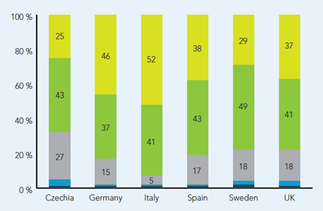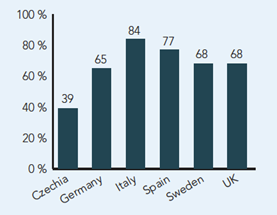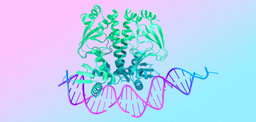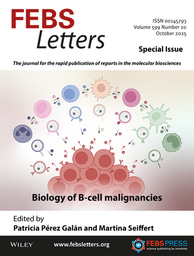Open Science experiments to drive institutional change

The world seems to agree that Open Science practices have the potential to improve the scientific system: improve transparency, facilitate collaboration, increase efficiency, provide access to knowledge for all, and increase public trust in science. Plan S and the European Open Science Cloud, for example, provide the necessary top-down push and the infrastructure for better sharing of knowledge. But how can these policies and recommendations be implemented at the institutional level? How can researchers be motivated to adopt these policies and implement them in their daily work?
Thirteen partner institutions from 8 countries came together in the ORION project (Open Responsible Research and Innovation to further Outstanding Knowledge), funded by the Horizon 2020 Science with and for Society program, to tackle this question. The project explored ways in which research and funding organizations in the life sciences and biomedicine can open up how they fund, organize and do research, and how Open Science and Responsible Research and Innovation (RRI) principles (ethics, gender, governance, open access, public engagement, and science education) can ultimately be embedded in those organizations. Our focus was on the Life Sciences, as the core partners of the consortium were leading life science research institutions: Centre for Genomic Regulation in Barcelona, Spain, Babraham Institute in Cambridge, UK, The Central European Institute of Technology in Brno, Czechia, and Max-Delbrück-Center for Molecular Medicine (MDC) in Berlin, Germany.
In the course of the 4.5-year project, the consortium experimented with different ways to open up the research engine. Co-creation experiments and Open Science training where at the heart of the project. Accompanying evaluation measured the impact of the conducted activities.
Co-creation
Co-creation in science means involving external stakeholders in the process of research, at any given point of the research life cycle. We started the ORION project with a public survey [1][2], conducted in Sweden, Germany, Italy, Spain, Czechia and UK, and asked the citizens whether – and if yes, how – they’d want to be involved in research. The overwhelming majority, with some national differences, wishes to be involved in research and is willing to donate time, resources and expertise to contribute to the scientific progress.

Fig. 1 Survey responses regarding the importance that the public gets involved across countries (percent). Yellow: very important, green: fairly important, grey: neutral, blue: not very important, black: not at all important.

Fig. 2 Respondents’ interest in getting personally involved across countries (percent of ‘yes’ answers).
To practice co-creation, ORION funded four different citizen science projects at consortium partners: SMOVE, GENIGMA, Vaccine and MELTIC. In all four projects, scientists collaborated with citizens to either harvest their expertise (SMOVE), crowd-source resources (GENIGMA), or to understand their current problems and needs to either design research questions (MELTIC) or effective science communication tools (Vaccine).
In another co-creation project, an art-science project, the Finnish artist Emilia Tikka worked with scientists for three months to create a proof of concept for her speculative design artwork ÆON: trajectories of rejuvenation and CRISPR. The artwork weighs the concrete future of genome editing against abstract fears about the use or misuse of the new technology CRISPR. ÆON [3][4][5] has been on display in Germany, UK and Sweden, and was very effective in sparking discussions on science’s possibilities and limitations to solve global challenges, as well as on the ethical dimensions of the fundamental research. ÆON was also used as a primer for a public dialogue [6][7] conducted by core ORION partners. The public dialogue’s aim was to inform institutional strategies on how to best communicate research findings on disruptive technologies to the society.
ORION also experimented with science funding strategies to promote co-creation [8][9] and involving external stakeholders in shaping institutional research strategies [10].
Open Science bottom-up
The second pillar of the ORION project was Open Science training for scientists, science support staff and policy makers. The aim was to raise awareness for Open Science concepts and tools and to motivate the participants to implement these in their daily work
We delivered over 40 live workshops in 16 countries and developed two online courses: Open Science in Life Sciences as well as a train-the-trainer MOOC. Accompanying research projects were also undertaken to analyse: 1) the extent of Open Science being a topic on the graduate curricula of non-university life sciences research institutes in Europe, and 2) how to integrate Open Science into the professional development programs for scientists (publication pending).
Furthermore, we produced fact sheets on Open Science and two seasons of the ORION Open Science podcast. In 44 episodes we interviewed experts on different aspects of Open Science, covering topics ranging from data sharing, publication policies, and intellectual property rights, to public engagement best practices. All of the training materials are CC BY licensed to be shared and reused and can be found on Zenodo.
Legacy of the ORION project
After 4.5 years the ORION project has concluded. Evaluation of the project clearly shows an attitude change towards Open Science in the participating institutions. At the beginning of the project, in 2017, the scientists were still debating whether preprints or even open access publishing were a good idea. In 2021 hardly anybody finds open access debatable nor is public engagement a niche phenomenon. Research data management has gotten on every scientist’s agenda. The question now is not 'whether' but rather how to best implement the Open Science principles.
We were of course lucky: the timeline of ORION coincided with a general and an increasingly decisive top-down push towards Open Science. This push, mainly from the European Commission, has now translated into national policies on funding, data sharing or publishing. However, although there is now a general awareness of the topic, the knowledge of how it translates into the daily work of a scientist or a scientific institution is still very sketchy. Having ORION at the participating institutions helped convert abstract ideas into concrete actions. At the end of the project, each participating institution has anchored Open Science principles in their institutional policies and strategies.
We hope that more projects like ORION can be implemented in the future. Meanwhile, our results and resources can hopefully inspire other institutions and individual researchers to make Open Science a reality.
ORION resources
If you want to know more about what we did during the project, please check out the Orion website and/or read the report from the final conference. Would you like to know more about the Open Science training or even bring it to your institution? Please contact Dr. Luiza Bengtsson [email protected]
All of ORION resources are publicly available:
The ORION Open Science Podcast https://orionopenscience.podbean.com also on Zenodo https://zenodo.org/communities/oosp_orionpod
ORION MOOC for Open Science in the Life Sciences 2.0
ORION Open Science Train-the-Trainer MOOC
ORION Open Science Training Resources on Zenodo
Deliverables
- D4.1 Optimised offline and online trainings
- D4.2 Open Educational Resources on Responsible Research and Innovation
- D4.3 Train-the-Trainer workshops
- D4.4 Final report on the training work package
Inspiring stories: https://www.orion-openscience.eu/publications/inspiring-stories
References
- https://www.orion-openscience.eu/publications/deliverables/201812/d23-public-attitudes-life-sciences-research-six-european-countries
- Lakomy et al, “The motivation for citizens’ involvement in life sciences research is predicted by age and gender“, PLOS, August 3, 2020, https://doi.org/10.1371/journal.pone.0237140
- https://www.mdc-berlin.de/news/news/eternal-youth
- https://doi.org/10.1038/d41586-018-07574-9
- https://www.youtube.com/watch?v=7kqXBSJf4PQ&t=4s
- https://www.orion-openscience.eu/index.php/publications/reports-papers/202103/public-attitudes-genome-editing-life-sciences-research
- https://www.mdc-berlin.de/news/news/unfamiliar-crispr-public-supports-basic-research
- https://www.orion-openscience.eu/publications/inspiring-stories/202105/encouraging-co-creation-through-funding-call
- https://www.orion-openscience.eu/index.php/publications/inspiring-stories/202011/pollution-project-captures-imagination-primary-school
- https://www.orion-openscience.eu/index.php/publications/inspiring-stories/202109/engaging-leaders-institutional-change
Photo by Christina @ wocintechchat.com on Unsplash





Join the FEBS Network today
Joining the FEBS Network’s molecular life sciences community enables you to access special content on the site, present your profile, 'follow' contributors, 'comment' on and 'like' content, post your own content, and set up a tailored email digest for updates.